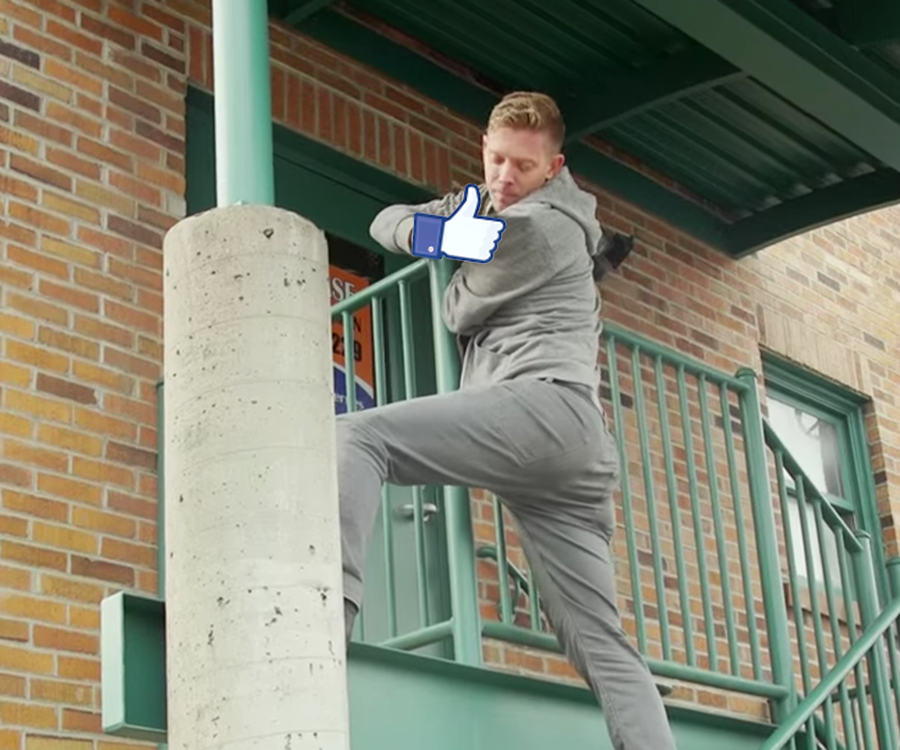
Strategy
How to Handle Going Viral
When you suddenly make it big online, make the most of your fame. Online Marketing Giant’s co-founder and CEO Brett Curry and Jeff Houghton, the creative mind behind “Instagram Husband,” share their tips on how to make the most of your viral fame.
By Rose Marthis | Photo courtesy Jeff Houghton
Jul 2016

With more and more focus being put on the number of shares and likes posts receive, it’s not unreasonable to think that any given moment your content might be the next to go viral. But how do you prepare for something so unpredictable? This is a question Brett Curry, co-founder and CEO of Online Marketing Giant (OMG), tries to answer every day for his clients. As a traffic and conversion agency, OMG develops strategies for clients to get the most out of their online presence. And one person who knows this firsthand is Jeff Houghton, the host of Springfield’s local late-night talk show, The Mystery Hour. The show released its “Instagram Husband” video last December, and it quickly took off, nabbing more than 5 million views. Looking back, Houghton learned what he would do differently to capitalize on the rush of attention and requests for his time.
Making the Connection
If you’re going to go viral, make sure you’re prepared. “The first thing you have to do is set up the next connection,” Curry says. What is an easy-to-implement and attractive offer that can direct someone to the next resource? If your viral hit is a video commenting on the social culture of Instagram, as in Houghton’s case, the next resource could be more videos produced by The Mystery Hour. At the very least, you want to capture an email from the viewer or page visitor so you can stay in contact and further the relationship. Houghton says everything happened so fast after they released “Instagram Husband” that he was scrambling to capture emails and sign up to partner with YouTube and Google to make a small percentage of the ad revenue. These are steps you should take care of beforehand so you don’t miss out on any profits.
Developing More Content
Once someone has connected with you, you want to direct them to more content that is relatable and valuable, Curry says. You can do this through ad banners and social media. For example, if you have a viral hit on camping gear, viewers can click a link to get the list of five camping essentials to never leave the house without, he says. Houghton says he was thankful The Mystery Hour already had a website and YouTube channel. He started looking at his YouTube channel differently, and realizing he needed to clean it up and put all the best videos near the top to attract more viewers. Houghton also suggests developing a digital strategy and calendar to plan when to publish new content to keep people coming back. If you build your subscriber base, more people will have more chances to see and share it, and that increases your chances of the next product going viral, he says.
Curry also advises looking at your search implications. If someone goes back to search for the video on Google or Bing, what are the results? You can optimize your page with proper title tags and capitalize on buzzwords to make sure people find what you want them to. When you receive press or mentions about the viral hit, keep talking about it. Write a blog post about the journey, give a thank you shoutout on social media and drive people back to the site, he says.
Filtering Through Friends
Jeff Houghton and The Mystery Hour released their “Instagram Husband” video on December 8, 2015, and it quickly reached one million views the next day. That first week was whirlwind of media requests, Houghton says. In between making appearances on talk shows across the country, he had other people asking for his permission to show the video. But not everyone asked permission, and Houghton found a lot of websites showing the video without crediting The Mystery Hour, a practice known as freebooting. And since everyone wants a piece of the action, there are even companies that will scour other sites for freebooting for you as a service, Houghton says. It can be hard to know who to trust, so Houghton advises talking to people who have had a similar experience and are unrelated to your viral moment. He was getting a lot of phone calls from people all over the country, and even agents and managers in Los Angeles and New York. “Those people are looking for digital hits,” Houghton says. “Those are just conversations leading to more conversations to learn about the digital industry, not to sign a contract.” Getting all these calls made Houghton wonder how people even found his phone number. It could be found through the registration of his domain name with GoDaddy, and it was included on his Internet Movie Data Base (IMDB) profile. He had to pay to make it not visible. But through all the new friend requests, Houghton stayed genuine. Even if you have a viral hit, he says it’s still about building relationships. If people like your content, they’re going to want to like you, and that’s how you can capitalize on your fleeting fame. “If you can show up, be consistent and be a good person, people will follow you,” he says.












